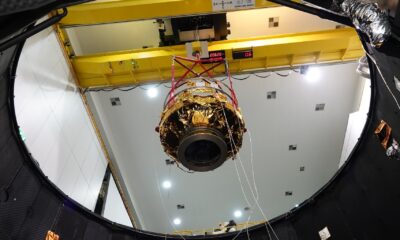Technology
European Space Agency Increases Budget to €22.1 Billion for Space Race

The European Space Agency (ESA) announced an increase in its budget to nearly €22.1 billion (approximately $25.6 billion) for the next three years. This decision comes as ESA seeks to enhance its presence in the global space race, particularly in light of growing competition from other nations. ESA Director General Josef Aschbacher expressed concerns that Europe might fall behind in space exploration if additional funding was not secured.
During a conference in Bremen, Germany, Aschbacher acknowledged the contributions of ESA’s 23 member states. He stated, “I think the message that Europe must catch up and get involved in order to literally give wings to Europe’s future through space travel was taken very seriously by our ministers.” His remarks underscore the urgency with which ESA is approaching its future endeavours in space.
Germany, one of ESA’s primary financial supporters, aims to increase its contribution to over €5 billion, up from just under €3.5 billion in the previous cycle. Dorothee Bär, Germany’s Space Minister, emphasized this commitment at the ESA Ministerial Council meeting, highlighting the nation’s role in strengthening Europe’s space capabilities.
In addition to budgetary increases, ESA is also eyeing future lunar missions. Aschbacher announced that ESA astronauts from Germany, France, and Italy are likely to be part of the upcoming lunar missions under the NASA Artemis program. He stated, “I have decided that the first Europeans to fly on a lunar mission will be ESA astronauts of German, French, and Italian nationality.” This initiative represents a significant step for European involvement in space exploration.
ESA is also advancing the establishment of a new Arctic Space Centre in Tromsø, Norway, as part of a recently signed letter of intent with the Norwegian government. The agency highlighted the Arctic’s importance as a scientific ecosystem with significant economic and geopolitical implications. ESA noted that space-based technologies could play a vital role in monitoring climate change, supporting sustainable development, civil safety, and regional energy management.
As an intergovernmental organization, ESA’s mission is to develop and enhance Europe’s space capabilities while fostering international collaboration. With the increased funding and ambitious projects on the horizon, ESA seeks to solidify its position as a key player in the global space landscape.
-

 Technology4 months ago
Technology4 months agoDiscover the Top 10 Calorie Counting Apps of 2025
-

 Health2 months ago
Health2 months agoBella Hadid Shares Health Update After Treatment for Lyme Disease
-

 Health3 months ago
Health3 months agoErin Bates Shares Recovery Update Following Sepsis Complications
-

 Technology4 weeks ago
Technology4 weeks agoDiscover 2025’s Top GPUs for Exceptional 4K Gaming Performance
-

 Technology2 months ago
Technology2 months agoElectric Moto Influencer Surronster Arrested in Tijuana
-

 Technology4 months ago
Technology4 months agoDiscover How to Reverse Image Search Using ChatGPT Effortlessly
-

 Technology5 months ago
Technology5 months agoMeta Initiates $60B AI Data Center Expansion, Starting in Ohio
-

 Technology4 months ago
Technology4 months agoRecovering a Suspended TikTok Account: A Step-by-Step Guide
-

 Health4 months ago
Health4 months agoTested: Rab Firewall Mountain Jacket Survives Harsh Conditions
-

 Lifestyle4 months ago
Lifestyle4 months agoBelton Family Reunites After Daughter Survives Hill Country Floods
-

 Technology3 months ago
Technology3 months agoUncovering the Top Five Most Challenging Motorcycles to Ride
-

 Technology4 months ago
Technology4 months agoHarmonic Launches AI Chatbot App to Transform Mathematical Reasoning




















